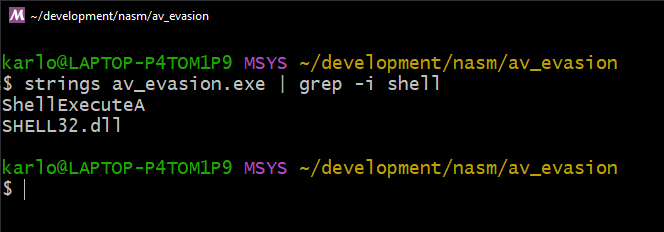String anti-virus evasion in x64 assembly (Part 2)
In my last blog post, I discussed a way to hide parameter strings from being detected by an anti-virus. The solution was simple and it worked. However, it was incomplete as strings of function calls and loaded DLLs were still detectable in memory.

In this post I'll be talking about the other technique from the same blog post we were following before. It does a good job of explaining the concept which I'll be covering here too. I will also be writing the code in assembly as an added bonus, so we can better understand what goes on under the hood.
The problem
Let's revisit our code from the last time. We have two functions being called ShellExecuteA and ExitProcess.
#include <windows.h>
#include <shellapi.h>
int main(void)
{
char ca_notepad[] = { 'n','o','t','e','p','a','d',0 };
ShellExecuteA(0, "open", ca_notepad, NULL, NULL, SW_SHOW);
ExitProcess(0);
}
Upon compiling …
String anti-virus evasion in x64 assembly (Part 1)
One of the features I implemented for my Remote Access Tool was an anti-virus evasion capability in the form of strings obfuscation. It wouldn't fool an EDR or a reverse engineer but it was quick to implement so I added it.
This was over a year ago. I decided to revisit this feature to try and understand it better and find out if it is actually effective.
What to expect
In this two-part blog post I will look into the following:
- Hiding argument strings
- Hiding API call strings
THe one you reading now is about the first one. I will be explaining how it's done in C and later convert it to x64 Windows Assembly so we can better understand what's happening under the hood.
Hiding function argument strings
I got the idea for this AV evasion technique from this blog post. The author posits that one part of an …